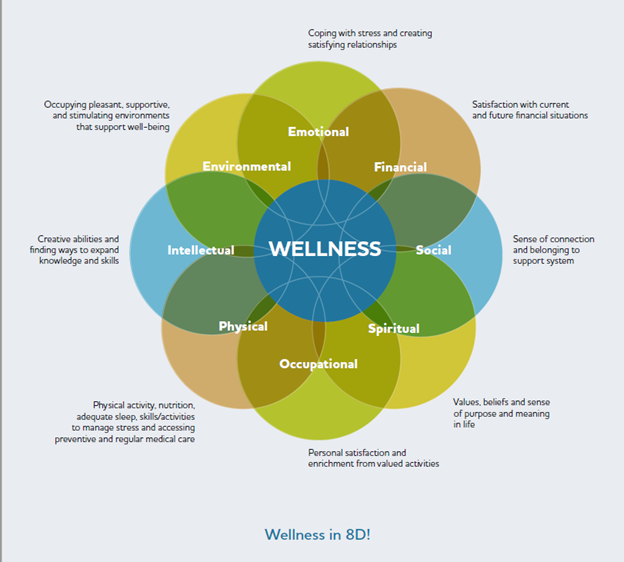Wellness
NJMS Circle of Wellness
At NJMS, we value the process of learning to create, maintain, and enhance personal wellness to achieve academic excellence. Our mission is to foster a culture that supports creating, maintaining, and enhancing lifestyle behaviors that will contribute to success in medical school. Housed in the Office of Student Affairs, the NJMS Circle of Wellness is dedicated to the health and well-being of all students. With students as partners, we will continue to listen, offer, create and enhance efforts to best meet your needs.
The NJMS Circle of Wellness has adopted the 8 Dimensions of Wellness model which offers a framework to explore individual and collective needs while considering the learning and social environment factors that impact not only medical education but overall individual wellness.
We encourage you to take the 8D quiz on a bi-annual basis to measure your level of wellness according to the dimensions below:
- physical (adequate nutrition, sleep, physical activity, stress management, access to preventative care and screenings)
- social (peer, community)
- emotional (managing stress and intense emotions, distress, self-regulation skills, managing or preventing crisis access to timely accessible mental health, substance use and/or trauma services and support, support for school-life/personal balance)
- intellectual (planning, time management, support activities that use and build creative abilities, and knowledge)
- school (schoolwork, career skill building, school-life-balance)
- spiritual (activities that align with values and that are meaningful and purposeful)
- financial (budgeting, planning savings, impact of poverty on student performance) and
- environmental (learning and community; impact of lack of decent affordable housing).
WHAT IS WELLNESS?
Wellness is a broad concept. We invite you to think of wellness as meaning being healthy in many dimensions of our lives. That includes the emotional, physical, occupational, intellectual, financial, social, environmental, and spiritual parts. These dimensions are interconnected, one dimension building on another.
We also recognize that we live in a multicultural world, and wellness encompasses many areas. We believe, for example, that trauma is a universal human experience, and that our culture and beliefs impact our perceptions and what we do. In summary, wellness is about how we live our lives and the joy, fulfillment and health we experience.
*as adapted from SAMHSA, Creating a Healthier Life with courtesy of Dr. Margaret Swarbrick

*Developed by Dr. Margaret Swarbrick

